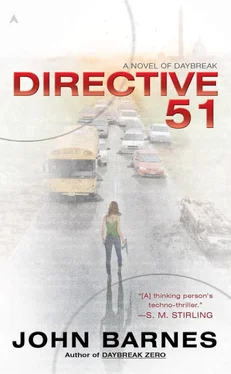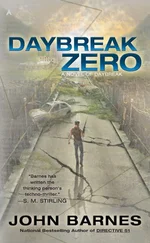“Well, it’s Allie. This’ll sound stupid. I just get… it bothers me that she’s so obsessed with finding out Graham’s secure location. I mean, okay, he’s one of her closest, oldest friends, okay, she really liked being his chief of staff, okay, all that, okay—”
Heather hugged him. “You know, two of my ex-husbands were really jealous of Graham, and after every divorce he was the first guy I ran to. It sort of goes with being his former student.”
“Did your exes have any reason to be jealous?”
“I don’t know. Graham never made a move. But his wife was still alive back then, and he was pretty crazy about her, and about his kids. Anyway, all I mean, Arnie, is that if you think your jealousy is irrational, it probably is.”
“I didn’t even want to think it was jealousy.” He turned and beat his hands on a dead tree, not hard, but as if trying to wake something up. “I feel so stupid and schoolboyish. It’s just… see, it’s really a New Asian thing, you know, the big deal they started making about it a few years ago when they realized that Asian-Americans were… um… well, not exactly taking over, but because… um.”
“I’m not one of the Euros who thinks you’re a menace, Arnie. And I read the news too, and we’re the same generation. I’m used to the idea that in most offices I’ve worked in there’s been way more dark straight hair than frizzy red like mine.”
“Wavy,” Arnie said. “Lenny always insisted it was wavy. You don’t get to change that. Even though at the moment”—he reached out and brushed her scalp—“it’s more fuzzy than anything.”
The mention of Lenny had brought tears to her eyes, and Arnie looked away awkwardly. “Anyway,” he said, “anyway, um… okay, so it’s like, why the deal with Allie is a New Asian thing, at least to me. See, there were two stereotypes. Nerdy genius people and stylish brilliant people. And for a guy like me—nerdy genius—the idea of someone as stylish and brilliant as Allison Sok Banh wanting me for a boyfriend… jeez, I don’t know if I can explain what it meant. It made me feel, I don’t know, different about myself, less like a freak, more like… um…”
“More like a genius, which you still are,” Heather said, firmly. “And you’re attached to someone who besides being brilliant and stylish, is also ambitious, and is used to climbing on the coattails of her mentor, who has just disappeared. Relax, Arn, the part of you that’s saying to just chill is right. Concentrate on the issue you just brought up, and thank you for making me pay attention. You’re right to be worried. If it’s really a war, we’re losing, and if it’s not we’ve got to stop fighting before we do something stupid.”
FOUR DAYS LATER. ATHENS. GEORGIA. 2:35 P.M. EST. MONDAY. DECEMBER 9.
“I’m looking for graphite lubricant,” Chris Manckiewicz said, “the pure stuff that’s used for a Linotype machine. I’ll trade cans of tomatoes for it.”
The old man behind the counter said, “You’re about two weeks too late. Guy came in here and bought me out of it just before Thanksgiving. Also got a box of matrices and I think some escapements from a torn-down Linotype.”
“Humm. Think he was getting them to sell or getting them for his own Linotype?”
“Oh, he was a hobby printer, easy to tell that, trying to set himself up as a real printer. I guess he’d got ahold of an old Linotype that had a gas heater for the metal pot or something, real old, World War One or so, in one of the little towns near here, and he had most of a couple more recent ones, and was trying to figure out how to cannibalize everything all together. Took every Linotype supply part I had. He’s local, and I’ve got his card because he wanted me to tag up with him if anything else for a Linotype came in. You want to get in touch with him and see if the two of you can do some kind of deal?”
Chris nodded. “Oh, yes, sir. Maybe he’s sorted out what he’s keeping by now; I’ll probably want anything he didn’t end up using. Hope he likes tomatoes.”
A few minutes later, Chris was walking south, in the middle of Lumpkin Street, hands well in sight, no weapons visible, all the things you did in a peaceable, functioning town nowadays. A beat cop stopped him for a minute to get his name and business—that happened to everyone all the time, these days, and Chris reminded himself to comment about that in some story soon—and seemed pleased that a newsman was looking for a local printer, and even more pleased to find out who it was. “Abel Marx is a good guy,” the cop said, “you’ll get along. And he’s no writer or reporter, he won’t be wanting to compete with you—he’ll be happy printing your paper. He’ll be glad to have a steady job to do with his printing stuff, he loves that, but even though he opened up his shop just a couple days after Daybreak, he hasn’t had much work yet, just the flyers for the town government.”
Reporters and policemen learn to keep a conversation going because you never know what bit of information might be useful, so Chris and the cop had a nice chat there in the street. The cop learned a great deal about conditions east and north of town. Chris learned that Athens, Georgia, hadn’t suffered terribly because so many of the students had fled homeward immediately, leaving the town with food reserves for a much bigger population; the remaining students, being young, strong, healthy, and willing to work, had been the labor force needed to deal with the many crises that Athens, like every other functioning town, had faced daily.
“And of course the real critical thing we did, we were able to throw out a line of militia all over to the west of town, so the refugee wave out of Atlanta were turned aside, or went back, or at least calmed down before we let ’em in. We really only had to hold about a half dozen crossroads,” the cop explained, “and from Atlanta to here is one long walk for hungry, desperate people, so they didn’t arrive in too good of a shape.
“Once we sorted the dangerous ones out, we could take in a lot of decent folks, put ’em in the dorms and hotels and all. The bad actors showed up early, and there was some bad fighting over by Bogart that I was in, but once we chased off the worst, we could be pretty Christian with the rest. I felt pretty good about that.”
Chris wrote down the officer’s name—John Longstreet—and station, thinking, FIGHTING AT BOGART—there’s a good long article to put together for some issue soon. VETERANS SHARE MEMORIES OF FIGHTING THAT SAVED OUR CITY. HEROIC LOCAL MILITIA KEEPS ATHENS SAFE. MILITIA VETERANS RECALL BATTLE OF BOGART. Something like that. Create local pride and tie it in to support for the paper.
“So how do you feel about Athens being declared the new capital?” Chris asked. “I was over in Lincolnton, on my way to Fort Benning, when I heard. So now I’ll just let the government come to me. Want to be my first man on the street?”
“Can you spell ‘this is gonna be a pain in the ass for us cops’?”
“Yep. And I can spell anonymous.”
“Then we have a deal. Abel ought to be in his shop, still, if you hurry.”
As he neared the university, he could see the scramble of preparations for the Temporary National Government that was supposed to at least try to be here before Christmas. Nothing could really have prepared a classic state-college town for abruptly becoming the capital of the United States, but at least the University of Georgia had enough big buildings with big rooms for meetings, smaller rooms for offices, and the remains of a library close at hand, as workers carried the paper books, journals, and so forth back from storage, scrounged for shelves, and dragged out most of the lounge furniture that had been put in when the library had gone electronic.
Читать дальше












